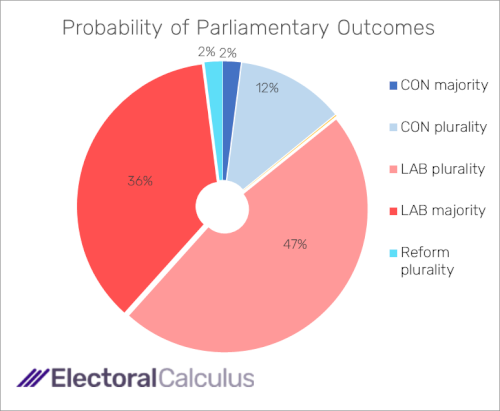If an election were held today, Labour has an 83 percent probability of winning the most seats. But that news is not so good as it looks. While having the most seats in the House of Commons, there is only a 36 percent probability that Labour would get the absolute majority needed to give it the decade-long control of government that Labour may need to claim credit for the big gains that may follow slowly from the pains contained in this week's budget.

It's good news for Labour that six Opposition parties would divide the spoils from a Labour loss of 66 seats from its landslide victory last July. A reduced majority would allow a Labour government to keep a lead of 175 seats over the official Opposition. The polls show the new Tory leader takes over a party that at present has a greater chance of falling as low as 73 seats than of winning a parliamentary majority at the next election.
Only two parties have seen their popular support change since the general election. Labour has gone down an average of 5 percentage points and Reform has gone up by a similar amount to 19.5 percent in the October polls. At the last general election Reform drew the great bulk of its vote from the Conservative Party and very little from Labour, helping the Liberal Democrats to win dozens of seats. Reform won only five seats.
Reform is now at a point where it is a threat to Labour MPs. Of the 98 seats where Reform finished second in last July's election, 89 have Labour MPs. Electoral Calculus reckons that of the 11 additional seats it would gain according to this month's poll figures, 10 would come from Labour and only 1 from the Conservatives.
In 89 seats Reform is the second-place challenger to a Labour MP. A combination of tactical voting for Reform by Tories whose candidate has no chance of winning and a further attrition of Labour voters could deliver dozens of seats to Reform where it is less than 20 percentage points behind Labour.
While the fragmentation of the Opposition protects Sir Keir Starmer from losing Downing Street to the new Tory leader, it leaves the Prime Minister vulnerable to the loss of his parliamentary majority. On the basis of its October slump, Labour would lose seats as well as votes to the Conservatives and Reform. Yet neither of these challengers would have enough seats to take control of Downing Street for itself.
Prof Richard Rose, University of Strathclyde, is Britain's senior election expert. He has been writing about elections at home and abroad for well over half a century.